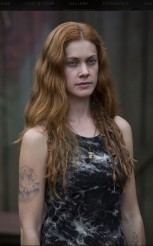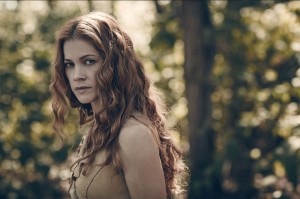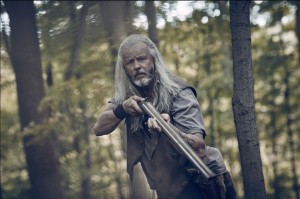In WGN America’s OUTSIDERS, the drama created by Peter Mattei airing Tuesday nights, the Farrell clan lives in a remote area of the Appalachian Mountains in Kentucky, as their families have for hundreds of years. A mining company is trying to force Wade Houghton, played by Thomas M. Wright, sheriff of the nearest small town, to get the Farrells off the mountain, but Wade is reluctant to do so. Meanwhile, Big Farrell, played by David Morse, has attempted to violently wrest leadership of his community from his mother. G’winn, the Farrell healer played by Gillian Alexy, is dealing both with Big Farrell’s bullying and her own romantic longings for the just-returned Asa (Joe Anderson).
Alexy, an Australian actress known for her work on McLEOD’S DAUGHTERS and her arcs on U.S. series including DAMAGES, THE AMERICANS and ROYAL PAINS, sits down first in Pasadena’s Langham Hilton Hotel to talk about OUTSIDERS. She is subsequently joined by fellow Australian Wright (the feature film EVEREST, the TV series THE BRIDGE and TOP OF THE LAKE) and American actor David Morse (most recently on the big screen in CONCUSSION, also known for ST. ELSEWHERE, TREME, THE GREEN MILE and a multitude of other credits over his three-and-a-half-decade career).
AX: Where is OUTSIDERS shot?
GILLIAN ALEXY: This is being shot in Pittsburgh, Pennsylvania.
AX: Was the Appalachian accent a challenge, or did you already have an American accent that you adjusted for the part?
ALEXY: Yeah, pretty much. I mean, I’d been working in a standard American accent for awhile now, because most of my work is here in the U.S. now, but yes, to get more of that Southern twang wasn’t too bad.
AX: The Farrell clan is preoccupied with freedom. What do you think G’Win’s definition of freedom is, because she’s actually living with a level of family and neighbor scrutiny that more conventional people don’t have?
ALEXY: I think G’Win, being the healer, is really connected to the Earth and what the Earth has to offer in terms of its medicinal qualities, and I think having a relationship with that is in some ways quite freeing, because you’re not reliant on doctors and medical systems and all of that. And just freedom in one’s self, for one’s own spirit and soul and feel good within yourself. No one can really take that away from you.
AX: Because she’s the healer, does that give her an additional level of authority that maybe some of the other characters in the clan don’t enjoy?
ALEXY: I think it definitely gives her a purpose. I think our tribe is all family – I don’t know if there’s too much of a hierarchy, but she takes her responsibility as healer to the tribe very seriously.
AX: Did you and Thomas M. Wright ever cross paths back in Australia?
ALEXY: We met on this one.
[Thomas M. Wright joins the conversation.]
AX: Of all of the characters, Sheriff Houghton seems to have the most easily empathetic point of view, since he’s trying to keep the peace between the mountain folk and the townspeople …
THOMAS M. WRIGHT: Well, yeah. I think he’s sort of being torn by all those significant forces that are at play in the series. He’s a character who’s really emblematic of the kind of reality of a town like Blackburg. He’s a small-town guy, his family’s lived there for a long, long time, and he’s just trying to cope, trying to get by. He’s a widower with a little boy and he’s obviously dealing with drug and alcohol issues, and caught between this huge resource company and this group of outsiders.
AX: Now, even though they’re drastically different – Ms. Alexy, you had an arc on THE AMERICANS, Mr. Wright, you were a regular on THE BRIDGE – you both seem to wind up in series that are sort of about what it is to be American. Are you finding that interesting as Australians working here?
WRIGHT: We are really outsiders, and I think we both probably have really strong perspectives about that sort of stuff, and you try to express that in your work. I think I often end up dealing with outsiders generally. I think TOP OF THE LAKE was very much that, and THE BRIDGE is also that, people in really trying, difficult circumstances, difficult landscapes, and certainly, like a lot of that isolation and that sort of thing. But when you come to tell American stories and you’re Australian, you do bring a perspective. It’s very different growing up in Australia.
ALEXY: Yeah, I don’t know. I think I just ended up on a lot of shows that were shot in New York [laughs], and then I moved to L.A. and I got a show that shoots back on the East Coast [laughs].
[David Morse joins the conversation.]
AX: To ask a somewhat superficial question, your cast mates Ryan Hurst and Kyle Gallner, who play fellow Farrell characters, are here at press tour with the same abundant hair and beards that they have on OUTSIDERS, whereas your hair is close-cropped and you are clean-shaven …
DAVID MORSE: I wish that was my real hair, but I think I would have been unemployed for a long time if that was mine – get ten years’ worth of hair up there.
AX: How is dealing with the wig and the beard?
MORSE: It’s part of the job. They spend an hour and a half putting the stuff on every day, and take time taking it off. But one of the things that’s interesting is, when we did the wardrobe, which is fantastic, that kind of stuff, it didn’t look like Big Foster to me until that wig was on. And once that was on, there was the character, and there was the world. We also talked about what is it, that when people go into town and the townspeople recognize somebody’s a Farrell, we had to find something that really identified them as being different than other people, and early on, we decided that all of our hair would be a good choice for that.
AX: Getting back to more serious issues, how would you say all of your characters feel about where their authority and autonomy extends to with other people and where it ends?
WRIGHT: I had someone call me a coward before. They said my character’s a coward. That’s fine if people want to perceive him that way or if they feel that there’s some aspect of that. But certainly he arcs away from that as the narrative unwinds. He becomes a much more active participant in his own life and in his own fate, because he’s really at the mercy of his own flaws at the beginning. He’s actively involved in hiding in his life. He has a small child, who he’s barely a father to, and he spends all his time drinking and on drugs. And I think a lot of people relate to that, to that aspect of hiding from your true self or not wanting to confront any real responsibility in their life. So he has to deal with that in the series.
ALEXY: You know, everybody’s trying to find their role in life, and in the world. And these characters are not apart from that at all. They’re all struggling to figure out where they fit and what their purpose is, and what their role is to the people around them, to their family members around them, within their jobs, whether it be sheriff of a town or the healer of a tribe, and I think that’s a very important, and interesting, hopefully, part of the story to watch, to see these characters try to figure out where they fit and what they’re meant to contribute.
WRIGHT: You’ve talked about that a lot, too, as a woman in a story like this, too, and about how important it’s been to you to have a really strong, really active participant in the whole narrative.
ALEXY: Like you said, our roles are not just black and white, defined by black and white, like you’re a mother, you’re a child, you’re a bad guy, you’re a cop. But yet we’re all human beings, and we’re all flawed and we’re all complex, and we’re all interesting and we all have stories to tell and we all have backgrounds, and as artists, actors are really interested in developing that and evolving that.
MORSE: I would just say, in terms of my character and the boundaries of authority, this is a guy who feels like there are no limits to his authority, there are no boundaries to his authority. And he keeps running up against the boundaries of people, and kind of reality hitting him hard in the face. And that’s part of, to me, what’s interesting about him, is that entitlement that he feels, and the world is not going the way that he believes it should.
WRIGHT: It’s so important that an actor like David takes this role on, and you’re lending so much humanity right from the beginning, even though the first thing you do – he kills his mother in the first episode, to immediately come from a sympathetic perspective to that place, to try and understand that, what is it to make that choice, what is it, and can I get behind this character and humanize him, and find some commonality with this person?
MORSE: I think that will be one of the things about watching the show, that’ll be interesting and surprising, is the feelings that you have about the sheriff or G’winn or Big Foster. When you get down the line, it’s not going to be where we started. You’re going to have a different feeling, a different perspective on these people, the more you learn about them.
WRIGHT: What was really important to me was that, someone who does something heroic, or has real agency in their life and their choices, it shouldn’t be – it’s not that those things are easy. Those choices have to be made out of real conflict, and those people have to be real and flawed, and you watch the series to take you to private moments to see things that you couldn’t see otherwise. So you need to see moments where these people are being f***heads and where they’re not, and not living properly, they’re not doing the right thing, even if their choices might carry them beyond that, they’re trying. So it was a great story to tell. It was very difficult, too, but we all become incredibly close on this series. Thirteen hours of narrative is extremely difficult in any circumstance, but I think we’ve dug pretty deep on this as a series.
ALEXY: We did [laughs].
WRIGHT: There’s obviously so much packed away in this series – there are a lot of unknowns that this series begins with. The design of this series is almost that you’re going to have to unpack these characters as it goes along. Everyone has hidden agendas, they’re doing things for veiled reasons you can’t entirely be sure of, and as the thirteen hours of story is told, you come to know them more and more, and come to understand them more and more, and I think it’s a show that’s also reluctant to delineate between the good guys and the bad guys. It’s a show that’s trying to be comfortable with gray areas, with trying to make a complex position about, how do you feel about these people, how do you feel about these characters?
This interview was conducted during WGN America’s portion of the most recent Television Critics Association press tour.
Follow us on Twitter at ASSIGNMENT X
Like us on Facebook at ASSIGNMENT X
Article Source: Assignment X
Article: WGN AMERICA’S OUTSIDERS: Gillian Alexy, David Morse, Thomas M. Wright – exclusive interview
Related Posts:













